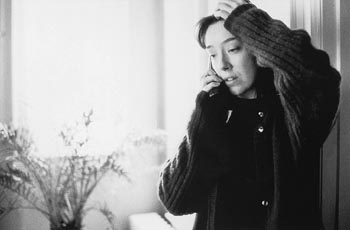![[Metroactive Movies]](/movies/gifs/movies468.gif)
[ Movies Index | Show Times | San Jose | Metroactive Central | Archives ]
 Call Waiting: Molly Parker waits anxiously for word about her missing child in Jeremy Podeswa's new film, 'The Five Senses.' Return to Scent The characters in 'The Five Senses' fit too neatly into director Jeremy Podeswa's structural plan SONOROUS BEAUTY infuses the Canadian import The Five Senses, by Jeremy Podeswa, yet afterward there seems to be nothing to it. The film may have been created for people more highly strung than I. The mahogany walls, the liturgical choral music on the soundtrack, Canada in the fall, perched on the brink of yet another cruel winter, ankle deep in sad, dry leaves--these visual reminders of only the deadest seriousness don't conceal the antique quality of the material. Bits of intelligence glitter out of The Five Senses, though. In the nearly all-female cast, Molly Parker plays Anna, a weeping mom whose daughter has vanished, and Nadia Litz, as Rachel, gives such an unsparing portrait of adolescent self-involvement that some mothers in the audience will yearn to slap her one. Best of all is bright-eyed Mary-Louise Parker as Rona, who defies the film's gloom. The Five Senses organizes its characters around the senses of hearing, touch, taste, sight and smell--each character represents exactly one sense, as if they were the Five Chinese Brothers. This kind of rigorous structure isn't really needed; the characters all know each other or rub shoulders with each other in their live-work space on Queen Street, across from Trinity Park in Toronto. Rona has a problem: a boy she had a meaningless affair with in Italy is descending on her, with no planned departure date and not enough English to discuss the matter. Rona's best friend, a gay but occasionally bisexual house cleaner (the Jack Lemmonish Richard Clarkin) isn't much help. Besides, he's in a crisis of his own. Under the delusion that his nose is good enough to smell whether someone loves him or not, he's auditing all of his old boyfriends (and one old girlfriend) to see if they're exuding the right scent. Next door to Rona lives an expatriate French optician (Philippe Volter) who is going deaf with a remarkable suddenness. Down the hall is Ruth (Gabrielle Rose), a masseuse. While tending to Anna, Ruth allows her daughter, Rachel, to take Anna's restless young child into the park across the street. When Rachel pauses to watch a pair of lovers in the underbrush, the child vanishes, imparting a life-or-death urgency to the film. If The Five Senses sounds like another movie with a dozen characters where six would do, you're right. And the short-story quality visible in Podeswa's last film, Eclipse, returns for a rematch. Podeswa tries to stir up instant emotions in a few moments, and the solemnity of his settings is such that he almost accomplishes it. In this almost Scandinavian chill, a line like "Nobody's touched me in such a long time" echoes so deeply that common sense almost can't squelch its resonance. But Podeswa overplays his hand. In one scene, the director tells us that dressing a sexually confused teen as a member of the opposite sex will suddenly clear up that confusion, or that a gold-hearted prostitute can cure a man of his isolation from the world. The lameness of the vision is spelled out by one of the characters: "People come into your life for a reason. It might not be forever, but it still means something." Instead, I'd argue that the spark and savor of life is in the irresolvable meaninglessness of encounters--that big pattern we can't see and that likely doesn't exist. Beautifully crafted as it is, The Five Senses is too modulated and therapeutic. What's best is the occasional untidiness of this too-tidy film: the hurt in Litz's eyes that doesn't seem peggable to any one trauma, or the surprise in Mary-Louise Parker's face when she realizes exactly how she feels about her Italian lover.
The Five Senses (R; 104 min.), directed and written by Jeremy Podeswa, photographed by Gregory Middleton and starring Mary-Louise Parker, Molly Parker and Nadia Litz, opens Friday at Camera 3 in San Jose. [ San Jose | Metroactive Central | Archives ]
|
From the July 27-August 2, 2000 issue of Metro, Silicon Valley's Weekly Newspaper.
Copyright © 2000 Metro Publishing Inc. Metroactive is affiliated with the Boulevards Network.
For more information about the San Jose/Silicon Valley area, visit sanjose.com.